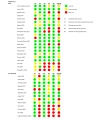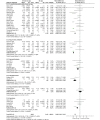The Effectiveness of Combining Nonmobile Interventions With the Use of Smartphone Apps With Various Features for Weight Loss: Systematic Review and Meta-analysis
- PMID: 35394443
- PMCID: PMC9034427
- DOI: 10.2196/35479
The Effectiveness of Combining Nonmobile Interventions With the Use of Smartphone Apps With Various Features for Weight Loss: Systematic Review and Meta-analysis
Abstract
Background: The effectiveness of smartphone apps for weight loss is limited by the diversity of interventions that accompany such apps. This research extends the scope of previous systematic reviews by including 2 subgroup analyses based on nonmobile interventions that accompanied smartphone use and human-based versus passive behavioral interventions.
Objective: The primary objective of this study is to systematically review and perform a meta-analysis of studies that evaluated the effectiveness of smartphone apps on weight loss in the context of other interventions combined with app use. The secondary objective is to measure the impact of different mobile app features on weight loss and mobile app adherence.
Methods: We conducted a systematic review and meta-analysis of relevant studies after an extensive search of the PubMed, MEDLINE, and EBSCO databases from inception to January 31, 2022. Gray literature, such as abstracts and conference proceedings, was included. Working independently, 2 investigators extracted the data from the articles, resolving disagreements by consensus. All randomized controlled trials that used smartphone apps in at least 1 arm for weight loss were included. The weight loss outcome was the change in weight from baseline to the 3- and 6-month periods for each arm. Net change estimates were pooled across the studies using random-effects models to compare the intervention group with the control group. The risk of bias was assessed independently by 2 authors using the Cochrane Collaboration tool for assessing the risk of bias in randomized trials.
Results: Overall, 34 studies were included that evaluated the use of a smartphone app in at least 1 arm. Compared with controls, the use of a smartphone app-based intervention showed a significant weight loss of -1.99 kg (95% CI -2.19 to -1.79 kg; I2=81%) at 3 months and -2.80 kg (95% CI -3.03 to -2.56 kg; I2=91%) at 6 months. In the subgroup analysis, based on the various intervention components that were added to the mobile app, the combination of the mobile app, tracker, and behavioral interventions showed a statistically significant weight loss of -2.09 kg (95% CI -2.32 to -1.86 kg; I2=91%) and -3.77 kg (95% CI -4.05 to -3.49 kg; I2=90%) at 3 and 6 months, respectively. When a behavioral intervention was present, only the combination of the mobile app with intensive behavior coaching or feedback by a human coach showed a statistically significant weight loss of -2.03 kg (95% CI -2.80 to -1.26 kg; I2=83%) and -2.63 kg (95% CI -2.97 to -2.29 kg; I2=91%) at 3 and 6 months, respectively. Neither the type nor the number of mobile app features was associated with weight loss.
Conclusions: Smartphone apps have a role in weight loss management. Nevertheless, the human-based behavioral component remained key to higher weight loss results.
Keywords: behavioral; behavioral coaching; coach; dietitian; mobile app; mobile phone; obesity; self-monitoring; tracker; weight loss.
©Jumana Antoun, Hala Itani, Natally Alarab, Amir Elsehmawy. Originally published in JMIR mHealth and uHealth (https://mhealth.jmir.org), 08.04.2022.
Conflict of interest statement
Conflicts of Interest: None declared.
Figures






References
-
- Hartmann-Boyce J, Johns DJ, Jebb SA, Aveyard P, Behavioural Weight Management Review Group Effect of behavioural techniques and delivery mode on effectiveness of weight management: systematic review, meta-analysis and meta-regression. Obes Rev. 2014 Jul;15(7):598–609. doi: 10.1111/obr.12165. doi: 10.1111/obr.12165. - DOI - DOI - PMC - PubMed
-
- Michie S, Richardson M, Johnston M, Abraham C, Francis J, Hardeman W, Eccles MP, Cane J, Wood CE. The behavior change technique taxonomy (v1) of 93 hierarchically clustered techniques: building an international consensus for the reporting of behavior change interventions. Ann Behav Med. 2013 Aug;46(1):81–95. doi: 10.1007/s12160-013-9486-6. - DOI - PubMed
-
- Podina IR, Fodor LA, Cosmoiu A, Boian R. An evidence-based gamified mHealth intervention for overweight young adults with maladaptive eating habits: study protocol for a randomized controlled trial. Trials. 2017 Dec 12;18(1):592. doi: 10.1186/s13063-017-2340-6. https://trialsjournal.biomedcentral.com/articles/10.1186/s13063-017-2340-6 10.1186/s13063-017-2340-6 - DOI - DOI - PMC - PubMed
Publication types
MeSH terms
LinkOut - more resources
Full Text Sources

